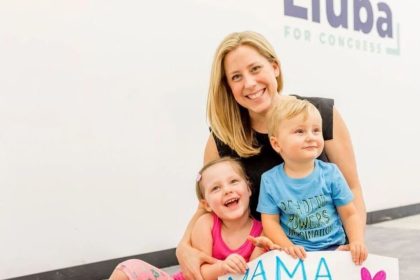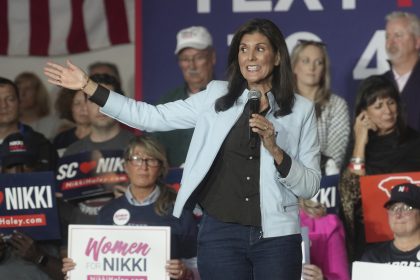Report Highlights Benefits of Allowing Campaign Spend on Child Care

WASHINGTON — The number of parent-candidates for federal office using campaign funds to cover their child care costs has jumped more than 600% since the Federal Election Commission approved the practice in 2018, but more needs to be done to expand the benefit to those seeking state and local office, a new analysis finds.
The study comes from the Vote Mama Foundation, a group founded by former Democratic congressional candidate Liuba Grechen Shirley after her unsuccessful bid to unseat incumbent Republican Peter King, of New York, six years ago.
During her run for office, Shirley, who had previously worked from home while providing full-time care for her two small children, then aged 1 and 3, learned first-hand how difficult it was to strike a balance between being a mother and a serious candidate for office.
About six months into her campaign, Shirley petitioned the FEC and became the first candidate to receive federal approval to spend campaign funds on child care.
In its decision the commission concluded that the Federal Election Campaign Act did not expressly address payments for child care expenses, and that in Shirley’s case, the expenses were a direct result of her campaign activity and therefore permissible under the law.
Though she lost the race, the agency’s decision allowed her to stay in the race and ultimately receive the highest vote share any Democrat had ever gotten in a campaign against the popular King.
Since then, as founder and CEO of the Vote Mama Foundation, Shirley has continued to work to overcome the systemic hurdles that mothers — and some fathers — face running for office and fighting for family-friendly legislation.
The organization’s latest study, “Campaign Funds for Child Care: A data-driven report on a structural solution for caregiving candidates,” builds on its previous work and takes a deep dive into an issue many voters don’t even know exists.
What it found was that the cost of child care impacts how and when parents are able to run for office. And in some cases, it said, the cost of child care may shut them out of the political system entirely.
“It is no wonder that just 6.8% of federal legislators and 5.3% of federal legislators are mothers with minor children,” the report said.
The authors, Sarah Hague, Louisa Duggan, and Maria Wilson, add bluntly: “The cost and accessibility of caregiving creates structural, financial, and logistical barriers to running for office.”
At the same time, they note that since the FEC’s decision in Shirley’s case, use of campaign funds for child care has increased exponentially.
In federal races, the number of candidates using campaign funds for child care increased 662% between 2018 and 2022, with 68 individual candidates running in 90 federal races.
As for state and local races, the number of candidates using campaign funds for child care surged by an almost astounding 2156% between 2018 and 2022, with at least 87 individual candidates running in 13 states.
But there is still more to be done, the foundation said.
For example, it noted that in Hawaii, candidates are allowed to use campaign funds to pay for a vehicle, but not campaign-related child care expenses.
In Iowa, another example it cites in the report’s introduction, candidates are allowed to use their campaign funds to pay for gala tickets, but not campaign-related child care expenses.
“In 20 states, candidates are allowed to use their campaign funds to cover the cost of mailers, staff salaries, yard signs and campaign office furniture, but not campaign-related child care expenses,” the authors write.
As a result the foundation continually works with elected officials and candidates on both sides of the aisle to authorize the use of campaign funds for the cause, by passing legislation, requesting Ethics Rulings and issuing secretary of state or attorney general opinions.
As of January, 30 states have brought their election finance statutes in line with federal regulations.
In 2023 alone, the Vote Mama Foundation secured the introduction of 23 pieces of Campaign Funds for Child Care legislation in 16 states.
The gold standard allowance, the group says, permits candidates to use funds on child care and dependent care for both campaign and official duties.
Among other key findings in the report, on the federal level it said:
- 46% of funds were spent by candidates of color.
- 51% of funds were spent by women.
- 60% of all funds spent by women were spent by women of color.
- 60% of all funds spent by women were used by Democratic women.
- 40% of all funds spent by women were used by Republican women.
- 77% of total Republican funds spent on child care were spent by women of color.
- A total of $717,706 has been spent by federal candidates on child care since 2018.
On the state level, the report showed:
- 70% of funds were spent by candidates of color.
- 38% of funds were spent by women.
- 70% of total funds spent by women were spent by women of color.
- More than $297,582 has been spent by state and local candidates on child care since 2018.
For those wanting to go even deeper into the topic, the Vote Mama Foundation website is rich with even more statistical data.
Among the most interesting landing pages on the website is the foundation’s “Politics of Parenthood” dataset, which it calls “the most comprehensive publicly available demographic dataset of state and federal legislators in the United States.”
It shows that currently only 6.8% of members of congress are women with children under the age of 18, while 17.8% of adults in the U.S. are women with children under the age of 18.
What that means is that 59 more women fitting that category would have to be elected to Congress for the chamber to proportionally represent the population of the United States.
On the state level, the foundation has found that only 5.3% of legislators are women with children under the age of 18, meaning another 926 would have to be elected to be proportionally representative of the population.
The foundation notes that as of 2022, Oregon had the only state legislature in all of the U.S. with proportional representation of mothers with minor children, while Alabama was the only state with no mothers of minors serving in the state legislature.
“Only eight states have even half the number of mothers needed for full representation, and 23 states have less than a quarter,” the website said.
The new report concludes by saying that campaign spending on child care has played a critical role in enabling women with minor children — and especially candidates of color — to run for elected office.
Overwhelmingly, this report indicates that candidates being allowed to spend campaign funds for childcare “is vital for accessibility and equity, and … is a structural solution that increases the diversity of candidates and elected officials.”
Dan can be reached at [email protected] and at https://twitter.com/DanMcCue
























